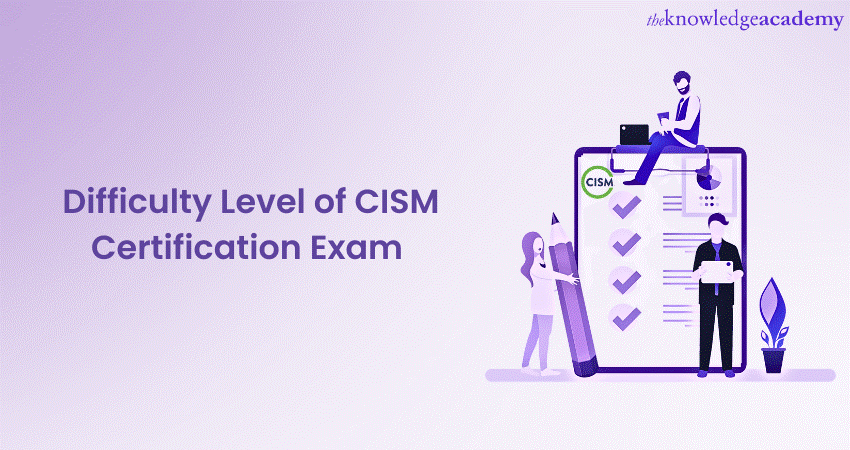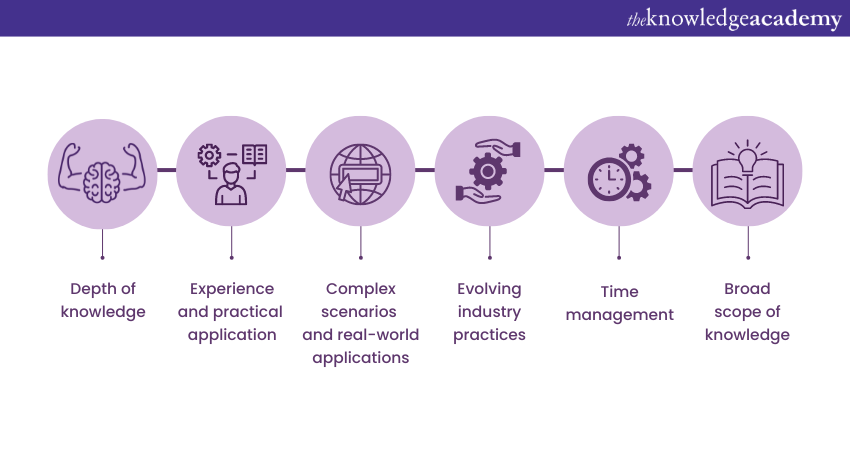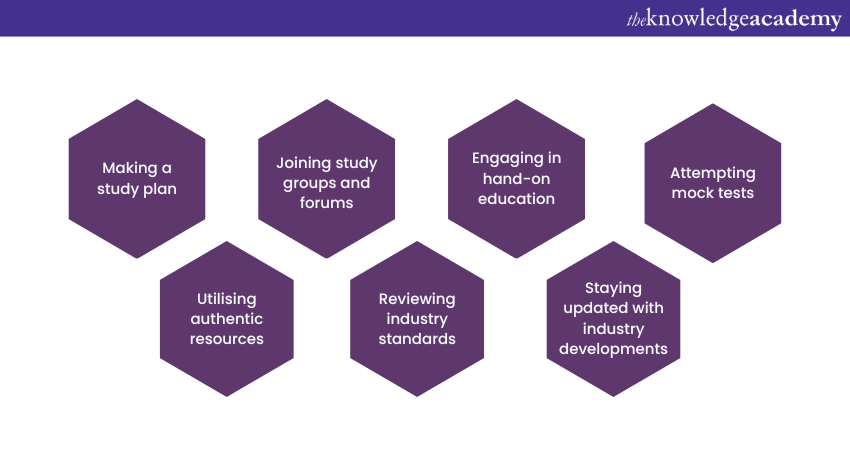We may not have the course you’re looking for. If you enquire or give us a call on +44 1344 203 999 and speak to our training experts, we may still be able to help with your training requirements.
We ensure quality, budget-alignment, and timely delivery by our expert instructors.

The Certified Information Security Manager (CISM) certification is highly regarded in the field of information security management. This globally recognised certification demonstrates an individual's expertise in managing, designing, and assessing an enterprise's information security program.
According to a survey by ISACA, 70 per cent of employees with CISM credentials experienced improvement on the job. The same survey revealed that over 40 per cent of CISM certified employees were also awarded a pay hike. These statistics indicate the value of attaining CISM credentials, which is why it is essential to understand the difficulty level associated with the CISM exam. If you are preparing for the CISM exam, check out this blog to learn how to become CISM certified and the difficulty level of clearing the CISM certification exam. and to know more about the cisa vs cism.
Table of Contents
1) Brief overview of CISM Certification Exam
2) Factors contributing to the CISM Difficulty Level
a) Depth of knowledge
b) Experience and practical application
c) Complex real-world scenarios
d) Evolving industry practices
e) Time management
f) Broad scope of knowledge
3) Recommended preparation strategies
4) Exam tips
5) Conclusion
Overview of CISM Certification Exam
The CISM certification is a globally recognised professional credential offered by ISACA (Information Systems Audit and Control Association). It is intended for professionals who aspire to excel in information security management. CISM certification validates an individual's expertise in managing, designing, and assessing an enterprise's information security program.
The CISM certification is of high regard and acceptance in the industry, demonstrating a professional's commitment to excellence and proficiency in information security management. It equips individuals with the necessary skills and knowledge to address the complexities and challenges of securing and managing organisational information assets.
To earn the CISM certification, candidates must pass the CISM exam, which evaluates their knowledge across four domains such as:
1) Information Security Governance
2) Information Risk Management
3) Information Security Program Development and Management
4) Information Security Incident Management.
Furthermore, The CISM exam consists of 150 multiple-choice questions that test candidates' understanding and application of the concepts within these domains. To pass the exam, candidates must achieve a scaled score of 450 or higher on a scale of 200 to 800.
The CISM certification demonstrates a professional's commitment to excellence in information security management. It gives them a competitive edge in the job market and opens doors to career advancement opportunities. CISM-certified individuals are equipped with the knowledge and skills to effectively manage information security programs, mitigate risks, and ensure information assets' confidentiality, integrity, and availability.

Factors contributing to the CISM difficulty level
The CISM (Certified Information Security Manager) certification exam is known for its challenging nature, requiring candidates to demonstrate a comprehensive understanding of information security management concepts and their practical application. Several factors contribute to the difficulty level of the CISM exam. Let's explore some key factors in detail:

Depth of knowledge
The CISM exam assesses candidates' knowledge across four domains, covering various topics within each domain. The depth of knowledge required is significant, as candidates must thoroughly understand information security governance, risk management, program development and information security incident management. Mastery of these domains requires extensive study and a solid grasp of the underlying principles and best practices.
Experience and practical application
While the CISM certification does not mandate specific professional experience as a prerequisite, practical experience in information security management significantly enhances a candidate's understanding and preparation for the exam. Real-world experience provides insights into the challenges and complexities of managing information security programs, enabling candidates to relate theoretical concepts to practical scenarios. It also helps in applying best practices effectively.
Complex scenarios and real-world applications
The CISM exam presents candidates with complex scenarios that mimic real-world situations. These scenarios require candidates to analyse, interpret, and apply their knowledge to solve problems and make informed decisions. The ability to navigate through intricate scenarios, consider multiple factors, and choose the optimal strategy is crucial to success in the exam. The exam assesses not only theoretical knowledge but also the practical application of that knowledge.
Evolving industry practices
Information security is a field with regularly emerging technologies, threats, and best practices. The CISM exam ensures that certified professionals keep updated with latest industry trends and practices. The industry's dynamic nature adds to the exam's difficulty level, as candidates need to demonstrate their awareness of current practices and adaptability to changing circumstances
Time management
The CISM exam comprises 150 multiple-choice questions that participants must complete within a fixed time frame, testing their understanding of information security management concepts, whether for CISM or CRISC certification. Effective time management is crucial to answering all questions in the allotted time successfully. The exam requires candidates to read each question carefully, analyse the options, and select the most appropriate answer. Time pressure adds to the overall challenge, necessitating candidates to be strategic and efficient in their approach.
Broad scope of knowledge
The CISM exam covers a wide range of topics, spanning the four domains and their subtopics. Candidates must demonstrate a holistic understanding of information security management rather than focus on specific areas. This breadth of knowledge requires thorough preparation and a comprehensive grasp of concepts, making the exam more demanding.
Learn to mitigate risk and manage data security, by signing up for the Certified Information Security Manager Training Course now!
Recommended preparation strategies
Preparing for the CISM (Certified Information Security Manager) certification exam requires a structured and focused approach. To enhance your chances of success, consider the following recommended preparation strategies:

Making a study plan
Develop a well-organised study plan that covers all the domains and subtopics of the CISM exam. Allocate dedicated time to each domain based on its weightage in the exam. A study plan will help candidates stay disciplined, track their progress, and ensure comprehensive coverage of the exam material.
Utilising authentic resources
Leverage official resources provided by ISACA, the organisation behind the CISM certification. The CISM Review Manual is a valuable study guide that provides in-depth coverage of all exam domains. Familiarise yourself with the manual and use it as a reference during your preparation. Additionally, ISACA offers a Question, Answer, and Explanation (QAE) Database that contains practice questions, which can help assess your knowledge and become familiar with the exam format.
Joining study groups and forums
Engage with other CISM candidates by joining study groups or online forums. Participating in such communities allows you to exchange knowledge, discuss challenging topics, and gain insights from others' experiences. Collaborating with peers can provide valuable perspectives and help you strengthen your understanding of the exam content.
Reviewing industry standards
The CISM exam examines your familiarity with industry standards such as ISO 27001, NIST Cybersecurity Framework, and COBIT. Review these standards and frameworks to ensure you have a solid understanding of their principles, implementation approaches, and their relevance to information security management.
Engaging in hands-on education
While the CISM exam primarily focuses on theoretical knowledge, engaging in hands-on learning can provide practical context to the concepts. Seek opportunities to apply your knowledge in real-world scenarios, such as through work assignments, projects, or simulations. Practical experience will strengthen your understanding of information security management practices and help you grasp the application of theory in practical situations.
Staying updated with industry developments
Information security is a rapidly evolving field. Stay updated with the latest industry developments, emerging threats, and evolving best practices. Subscribe to industry publications, blogs, and newsletters to stay informed. Understanding current trends will demonstrate your awareness and readiness to adapt to the evolving landscape of information security.
Attempting mock tests
As you near the completion of your preparation, take mock exams to simulate the actual exam environment. Mock exams help you gauge your readiness, identify areas that require further focus, and practice time management. Analyse your performance and use the feedback to fine-tune your preparation strategy.
Candidates must note that the preparation for the CISM certification exam is a journey that requires dedication, discipline, and consistent effort. They can increase their confidence, optimise performance, and maximise their chances of success on the CISM exam, by following these recommended strategies and investing sufficient time in their preparation.
Conclusion
Attaining the CISM certification requires thorough preparation and dedication. The exam's difficulty level is influenced by factors such as the necessary depth of knowledge, practical application, complex scenarios, evolving industry practices, and time management. To succeed, create a study plan, utilise official resources, join study groups, and practice with sample questions. Stay updated with industry developments, engage in hands-on learning, and take mock exams. Candidates can successfully pass the CISM certification exam by following these strategies, and open doors to career opportunities in information security management.
Enhance your information security management skills with CISM Training courses. Sign up now!
Upcoming IT Security & Data Protection Resources Batches & Dates
Date
 CISM Certified Information Security Manager
CISM Certified Information Security Manager
Sat 3rd May 2025, Sun 4th May 2025
Tue 6th May 2025
Mon 2nd Jun 2025
Sat 7th Jun 2025, Sun 8th Jun 2025
Sat 5th Jul 2025, Sun 6th Jul 2025
Mon 7th Jul 2025
Sat 2nd Aug 2025, Sun 3rd Aug 2025
Mon 4th Aug 2025
Mon 1st Sep 2025
Sat 6th Sep 2025, Sun 7th Sep 2025
Sat 4th Oct 2025, Sun 5th Oct 2025
Mon 6th Oct 2025
Mon 3rd Nov 2025
Sat 8th Nov 2025, Sun 9th Nov 2025
Mon 1st Dec 2025
Sat 6th Dec 2025, Sun 7th Dec 2025






 Top Rated Course
Top Rated Course


 If you wish to make any changes to your course, please
If you wish to make any changes to your course, please


